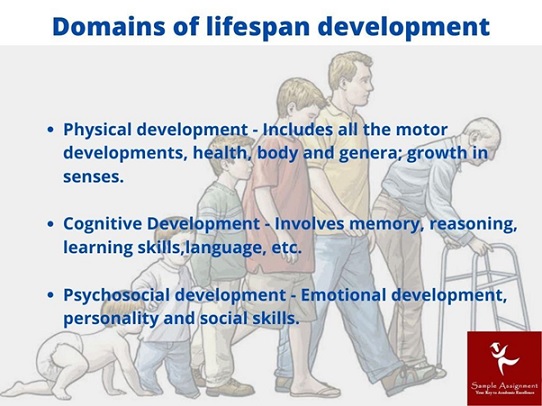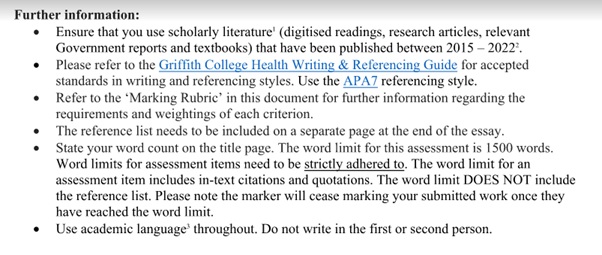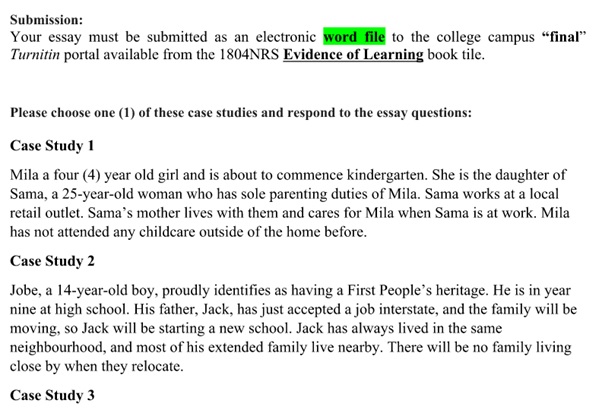This course 1804NRS teaches students about psychosocial theories and principles that guide human behaviour. Students will gain knowledge through extensive reading, group discussions in class, experience therapeutic techniques, and online exercises. The emphasis will be on presenting abilities. It is common for students to look for 1804NRS assessment answers to get help through their academic venture.
The unit 1804NRS aims to acquaint students with the psychosocial ideas and ideas that guide human behaviour to help them comprehend how individuals interact with health and sickness. Students who complete it will have the information necessary to support assessments of psychosocial health and the treatment of people with psychological and mental health concerns in their families, communities, and themselves. It examines how people grow throughout their lives and how social, psychological, and physical elements interact. The course also seeks to provide students with the chance to critically analyse societal causes of disease and adopt a global perspective on health, wellbeing, and ill health.
Sample Assignment is the right place for you if you're looking for the 1804NRS Psychosocial Development across the Lifespan assignment help. We would provide you with the best academic guidance as well as essay writing service at a very low price rate.

What are the Learning Outcomes of Studying this Unit?
This unit falls under the diploma of psychology, and the following are the learning outcomes provided by our 1804NRS academic assistance experts.
- Determine the critical elements that affect how humans behave and their lifespans evolve;
- Describe the emotional, cultural, and environmental influences that affect people, families, and communities; and
- In the interdisciplinary team context, describe the Registered Nurse's role in fostering psychological and emotional well-being.

Psychodynamic Theories for Lifespan Development
Psychodynamic theorists contend that a person's development is a continuous, active process influenced by both conscious and unconscious social and emotional events and innate biological drives. Over time, psychologists have proposed several development theories that every human being's general psychological development, from infancy to adulthood, is influenced by various factors.
The lifespan development theories are elucidated below.
The Psychosocial Theory of Development
Eric Ericson laid down the Psychosocial Theory of Development. In his early life, Ericson studied psychoanalysis with Freud's daughter, Anna, who also influenced his theories of personality development.
Erikson maintained that personality develops via eight stages of psychosocial development in a specific order from infancy to adulthood. At each stage, the person experiences a psychological dilemma, which may or may not impact how their personality develops.
Erikson believed that social factors, such as social abilities and attitudes, will affect how we perceive ourselves concerning other people. Throughout a person's lifespan, developmental changes take place. Three interconnected factors are in play, influencing them:
- The person's physical and biological capabilities and limits
- The individual's particular living circumstances and developmental history, such as their early family experiences and how well they overcame prior developmental crises
- The specific social, cultural, and historical factors are at play throughout the person's existence. For instance, racial discrimination, poverty, quick technological change, or conflict.
Psychosocial Stages of Development
According to Erikson, there are eight stages of development throughout a person's lifespan, from birth to old age. His anthropological research enhanced Freud's theory of phases and impacted it.
The stages of lifespan development are -
|
Psychological Stage |
Age of Development |
Description |
|
Trust vs Mistrust |
Birth (0) - 18 months |
With an emphasis on oral-sensory activities, the growth of self-trust (hope) and confidence, as well as trustworthiness connections with caregivers. |
|
Autonomy vs shame and doubt |
1 - 2 years |
The development of control over physiological processes and actions; a focus on muscular-anal activity. |
|
Initiative vs guilt |
3 - 6 years |
Focuses on motor and genital activity while taxing your self-confidence and willpower to the maximum (purpose). |
|
Industry vs inferiority |
7 - 11 years (latency stage) |
Focuses on productivity, expertise, and mastery (competence). |
|
Identity vs role confusion |
Teenage or adolescent years |
Emphasizes forming an identity and a comprehensive self-perception (fidelity). |
|
Intimacy vs isolation |
20s and 30s (early adulthood) |
Focus on developing a loving relationship and your work. |
|
Generativity vs stagnation |
in the 40s to 60s (Middle adulthood) |
Focuses on finding fulfilment via innovative, useful work that benefits future generations (care). |
|
Ego integrity vs despair |
60s to old age |
Ensure that you believe life is honest, including your accomplishments and misfortunes (wisdom). |
The Psychosexual Theory of Development
Psychodynamic theory is based on psychoanalysis, a method of studying and treating psychological issues developed by Sigmund Freud (1856 & 1939). According to Freud's psychoanalytic theory, people's personalities and behaviours are shaped by unconscious forces as they work out conflicts between their biological desires and societal expectations.
According to Freud, childhood development is discontinuous; each of us must go through a number of stages. Before diving further into the stages of development, we must understand Freud's three-part structure of our mind.
The Three-part Structure of Personality
According to Freud's personality theory, the human psyche consists of three fictitious brain constructs, the id, the ego, and the superego, that make up each person's personality.
- The id - The id is a part of the unconscious that contains all urges and impulses, including the libido, a form of basic sexual energy from survival instincts to aesthetic appreciation. The id may also be a little stubborn since it only responds to what Freud called the "pleasure principle" and nothing else.
- The ego - The ego is that portion of the id that the external environment has directly altered. According to Freud, the psychological characteristic involved in coping with reality is the ego, which develops from the id and functions in the conscious, preconscious, and unconscious mind. The ego is the only element of the conscious personality. The ego is built on the realism principle, which aspires to real libido and primarily concentrates means on satisfying cravings.
- The superego - The superego combines social norms and values that one picks up from others and their parents. It appears during the phallic stage of psychosexual development, between the ages of 3 and 5. The superego, a part of the unconscious, is where self-criticism and the voice of conscience originate.
Psychosexual Stages of Development
Developmental changes arise from conflicts between the id, ego, and superego at each level. The ego, or sense of self, can be threatened by these conflicts. The id pushes the individual to behave impulsively to experience instant pleasure; the ego pushes them to act more realistically and the superego pushes them to uphold moral standards.
Thus, the psychosexual stages can be summed up as follows -
|
Psychosexual Stage |
Age of Development |
Description |
|
Oral Stage |
Birth (0) - 1 year |
Feeding and weaning are the main focal points of stimulation and interaction in the mouth. The newborn derives pleasure from oral activities like sucking and chewing. |
|
Anal Stage |
1 - 3 years |
During the anal stage, the libido's primary concentration is on controlling bowel and bladder movements. |
|
Phallic Stage |
3 - 6 years |
The stimulation is directed toward the genitalia (penis, clitoris, and vagina), with gender roles and moral development playing a key part. |
|
Latency Stage |
6 - 12 years |
An interval during which there is no sexual activity; instead, the focus is on physical, social, and intellectual pursuits. The superego is becoming more and more. |
|
Genital Stage |
12 - adulthood |
With puberty, attention turns to stimulate the genitalia. As phallic sexual drives reappear, mature sexual relationships grow and last far into adulthood. |
Psychology units can be tricky to study while taking up much of your time. This is why you would want to hire our 1804NRS academic assistance. Along with professional guidance, we also provide the best 1804NRS dissertation help to save you valuable time while helping you finish all the assignments on time and impress your professors.
1804NRS Assignment Sample Online




You can also access the assignment solution on 1804NRS provided by our experts at a very low price and easily complete your assessment paper. Hence, Sample Assignment becomes the one-stop solution for your psychology assignment help search.

Why Choose Us?
You don't have to keep searching for assignment help in Australia, as here in Sample Assignment; we have the answer for all your needs. Hiring our services has loads of benefits such as -
- Experts rigorously following the formatting requirements and university criteria.
- We know that students may only use one task's investment dollars. Because of this, we perhaps provide the finest pricing in the industry.
- We have strict anti-plagiarism procedures and promise that you will submit excellent essays with original content. As further assurance of our work's authenticity and for your pleasure, we additionally offer a free plagiarism report.
- We have a committed team that is ready round the clock to respond to all of your questions. You are welcome to contact us at any time, day or night via live chat, phone call, or email assistance.
- We provide a variety of payment methods for your convenience. PayPal, credit cards, debit cards, and internet banking are all options. Paying is quick and simple.
We have all our services rightfully tailored to meet the budget of students. So what are you waiting for? Connect with us now!
Frequently Asked Questions
From conception to death, life-span psychology seeks to recognise and shed light on typical developmental shifts in all facets of psychological functioning, including but not limited to personality.
There are several career options available to you with a psychology diploma, including -
- Counselor
- Therapist
- Social Psychologist
- Community Worker
- Educational and career counsellor
Yes, we have a group of subject-matter specialists who will work on your projects; regardless of the subject or course they are for, you will receive only the highest-calibre work done in the quickest time possible.
Apart from a bank transfer, debit card or master card, we also accept several online payment options, including Razorpay and PayU.
Clients Speaks
Order Now @ Upto 50% Off
Get
Flat 50% Off
on your Assignment Now!









